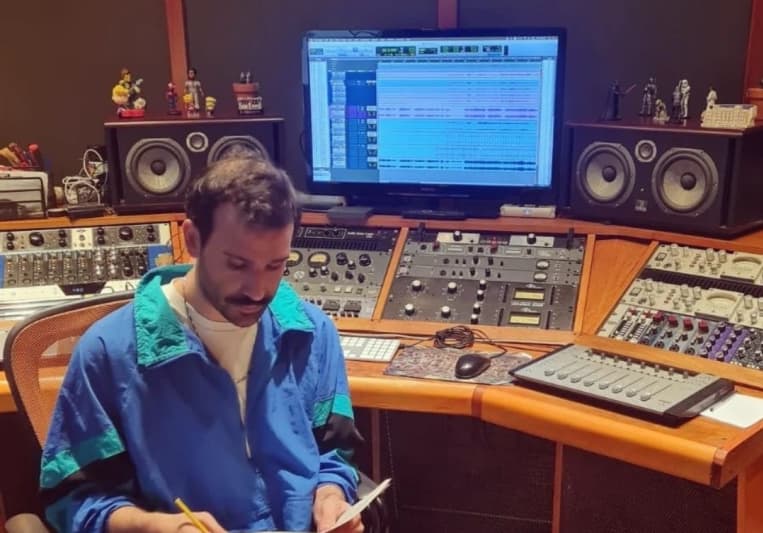
Professional music composer for media, jazz performer and music producer with +10 years of experience. Sound production, instrumental writing and arrangements as well as electronic and electroacustic techniques. Currently active in the intense Buenos Aires music scene.
From indie, soul and synthpop productions to film scores: I bring to the projects a strong background in sound design and afro-american music (jazz/soul/funk) as well as 60s/70s/80s production techniques.
Musicians and producers choose to work with me because I bring character and attitude to the sound and can lead different types of prodcutions: from one person in the box to big instrumental ensemble recordings in professional studios.
You can hear my selected works here: https://soundcloud.com/franco-donadio/sets/selected-tracks
I'd love to hear about your project. Click the 'Contact' button above to get in touch.
Endorse Franco Donadio6 Reviews

Loved Franco's work, really dig the sounds and style i asked for.
Great communication and experience!
Thanks a lot!
Great experience and work

Great work! Thank you, Franco, for your commitment and excellent service.

Excellent work !

Great work, it was exactly what I was looking for, very original and innovative!

Excellent service and quality
Interview with Franco Donadio
Q: Tell us about a project you worked on you are especially proud of and why. What was your role?
A: I made everything except 50% of the mixing and the mastering: https://open.spotify.com/intl-es/track/2M7mADFXN5OIQmc1uv0aSn?si=60f117257a134c97
Q: What are you working on at the moment?
A: Drum sample packs in 70s funk / soul + produced to be used in neo-soul, indie , trap, etc... projects. Recorded with my TASCAM 424 MkI
Q: Analog or digital and why?
A: Both, analog is a good way to achieve identity not only because of how it sounds but because it forces you to take desitions in a limited cotetext (the greatest creativity booster) and it introduces "errors" or "noise" that may show up as new tools. Digital is good and is obvious for me and for most people why it's good, if you know how to work. I take no sides in this.
Q: What's your 'promise' to your clients?
A: It will groove, it will be emotional
Q: What do you like most about your job?
A: Looking for the sound identity of the song or project
Q: What's the biggest misconception about what you do?
A: Although I can guide the whole process, it's not always necessary.
Q: If you were on a desert island and could take just 5 pieces of gear, what would they be?
A: Some sort of infinite power supply, a laptop with in-built interface, 2 mics, a synth. I would record the island and play with the sounds, the synth and my voice. If I want another instrument I would just figure out how to build it with the materials I can find in the island.
Q: What was your career path? How long have you been doing this?
A: My early years where all about learning jazz and how to program synths, record and make noise. After achieving my goal to really play jazz and undesrtand music at a deep level (a.k. a.: being a professional musician) I started to work with arrangements and production. My soloist project is a indie psychedelic rock project that reunites my most beloved influences.
Q: How would you describe your style?
A: Everything (except from orchestral music) with a 60s/70s/80s flavour + immersive and sensitive approach, full of texture (intstrumental and sound desgin) + strong rhtyhms/grooves/beats with melodic / rhythmic hook
Q: Which artist would you like to work with and why?
A: I would like to work with Ruban Nielson
Q: Can you share one music production tip?
A: Music is attitude and has to make a statement. This can come out from production techniques, recording approaches, compositional ideas or all of them toghether, but the main goal is to make and communicate a strong statement though music.
Q: What type of music do you usually work on?
A: Indie Rock, Funk/Soul/Jazz, Synthpop or electronic music that mixes indie with afro-american music, instrumental ensembles + synthesizers or sound design.
Q: What's your strongest skill?
A: To really feel.
Q: What do you bring to a song?
A: Authentic sound identity by looking for the sweet spot between attitude, musical ideas and production techniques / experimentation.
Q: What's your typical work process?
A: First of all, understand what the project is about, get into the client's vision, hear a lot. Then, talk about how can I contribute to the music, how can I serve the music from my vision and skills and undestrand what's my place in the process as a whole. If it's not 100% technical / formula driven I take some timespan to experiment (it can vary from a few hours to days, depending on the budget and deadlines). After that first phase, I tend to work as fast as the project allows, with the appropiate checkpoints for the client and the team.
Q: Tell us about your studio setup.
A: Home studio for vocals and in the box music production.I work with state of the art recording studios in Buenos Aires.
Q: What other musicians or music production professionals inspire you?
A: Unkown Mortal Orchestra, Motown productions, tape recording engineers, 2000s soul, 60s/70s/80s sound
Q: Describe the most common type of work you do for your clients.
A: Indie rock, soul and jazz band / ensemble production and recording. Electronic / hybrid productions.

I was the composer, singer, performer and producer in this production
- ProducerAverage price - $250 per song
- Ghost ProducerAverage price - $350 per song
- Film ComposerAverage price - $150 per minute
- Full instrumental productionContact for pricing
- Pop-Rock ArrangerContact for pricing
- Sound DesignContact for pricing
- Keyboards - SynthAverage price - $50 per song
- Tame Impala
- D'Angelo
- FILM SCORE



